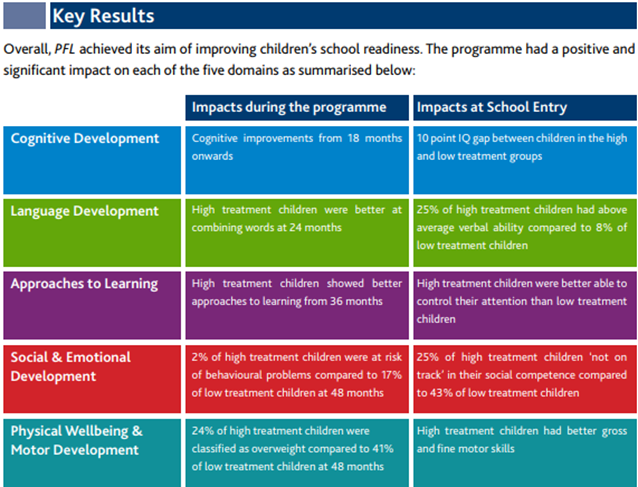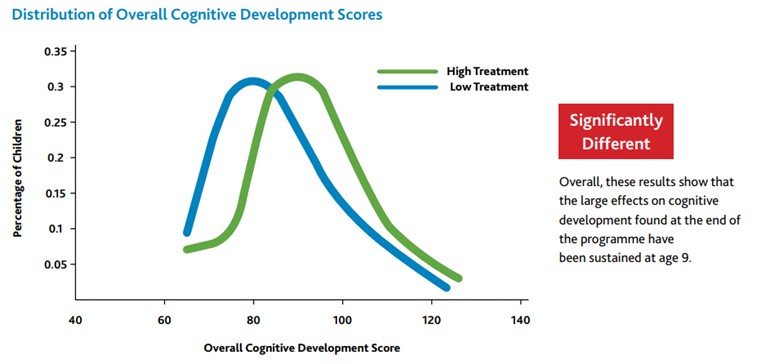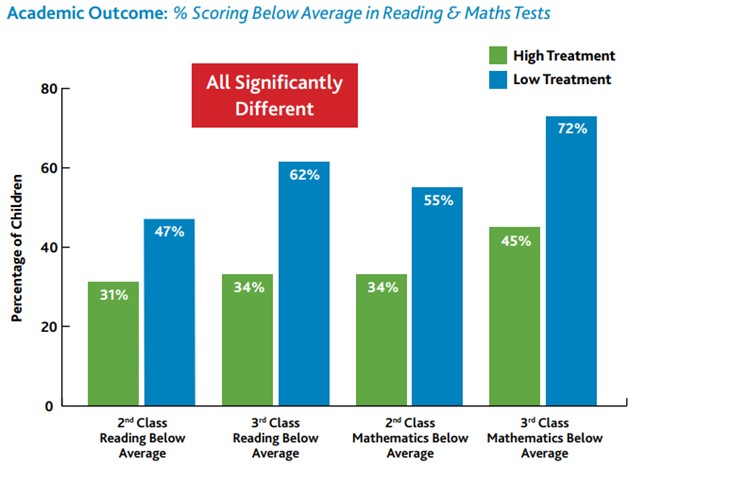PFL is the subject of one of the largest RCT assessments of Home Visiting programmes in Europe. Overseen by Dr. Orla Doyle, Geary Institute, University College Dublin. From 2008 (and still ongoing), the evaluation team followed the journey of 233 families in the programme. Families were randomly assigned to either a high treatment group or a low treatment group. By following children from birth through to school entry, and then again at age 9, the evaluation examined the impact of PFL on the following areas of children’s development:
- Cognitive Development
- Language Development
- Approaches to Learning
- Socio-Emotional Development
- Physical Wellbeing & Motor Development
Information was gathered at multiple time points from parents, children, hospitals, schools, and teachers using questionnaires, observations, direct assessments, medical records, and interviews. The research found the programme to be effective in achieving positive outcomes in several parenting, learning and child health and development domains. These findings mirror international research into the efficacy of home visiting programmes
Age 5 / School Entry
At age 5 / school entry, the evaluation found that PFL was effective at improving children’s school readiness across all these domains, particularly in terms of children’s cognitive development, physical wellbeing, and motor skills. The programme also had some impacts on parenting and the quality of the home environment; however, these impacts were smaller and less consistent. Some of the highlight outcomes that we have seen for children and families over time are outlined below.

Age 9 / Four Years after the Home Visiting programme ended.
At the Age 9 Follow Up, the PFL children ranged in age between 7 and 11 years, with an average age of 9 years old. For participants who agreed to take part in the Age 9 Follow Up study, three types of data were collected: direct assessments of children, interviews with parents, and data from schools.
At age 9, the PFL programme had a significant and large impact on children’s cognitive development. Children who received the high treatment supports had better general cognitive functioning, spatial abilities, non-verbal reasoning skills, and verbal abilities.

PFL also had a significant and positive impact on children’s executive functions in terms of improving their inhibitory control, attention flexibility, and working memory. These significant outcomes translated in significant differences in how the children in the programme performed in standardised tests in school compared to their peers. This also indicates the lasting effects of the programme, years after the programme ended.

Age 13 Follow Up
In 2023, the research team will return to the families to gather data and review outcomes for children at age 13, eight years after the programme was completed.
More Information / Publications.
PFL at Age 5: Did Preparing for Life Improve Children’s School Readiness?
PFL at Age 9: Assessing the Continuity or Fade-Out of Effects.
All of the various reports are available at the Geary Institute / PFL Archive page: UCD Preparing for Life
To hear Dr. Orla Doyle speaking about the research please click here:
